
Would you like some Engrams with that?
The post <i>Marathon</i> Pre-Order Bug Forced Players To Automatically Install <i>Destiny 2</i> appeared first on Kotaku.


Would you like some Engrams with that?
The post <i>Marathon</i> Pre-Order Bug Forced Players To Automatically Install <i>Destiny 2</i> appeared first on Kotaku.

You also get a one-month trial to the Xbox GamePass, plus access to Alexa+ for free.
The post Amazon Pushes Its Streaming Devices as the AI-Powered Fire TV Cube Hits Its First Low of the Year appeared first on Kotaku.
Even as exposure to floods, fire, and extreme heat increase in the face of climate change, a popular tool for evaluating risk has disappeared from the nation’s leading real estate website.
Zillow removed the feature displaying climate risk data to home buyers in November after the California Regional Multiple Listing Service, which provides a database of real estate listings to real estate agents and brokers in the state, questioned the accuracy of the flood risk models on the site.
Now, a climate policy expert in California is working to put data back in buyers’ hands.
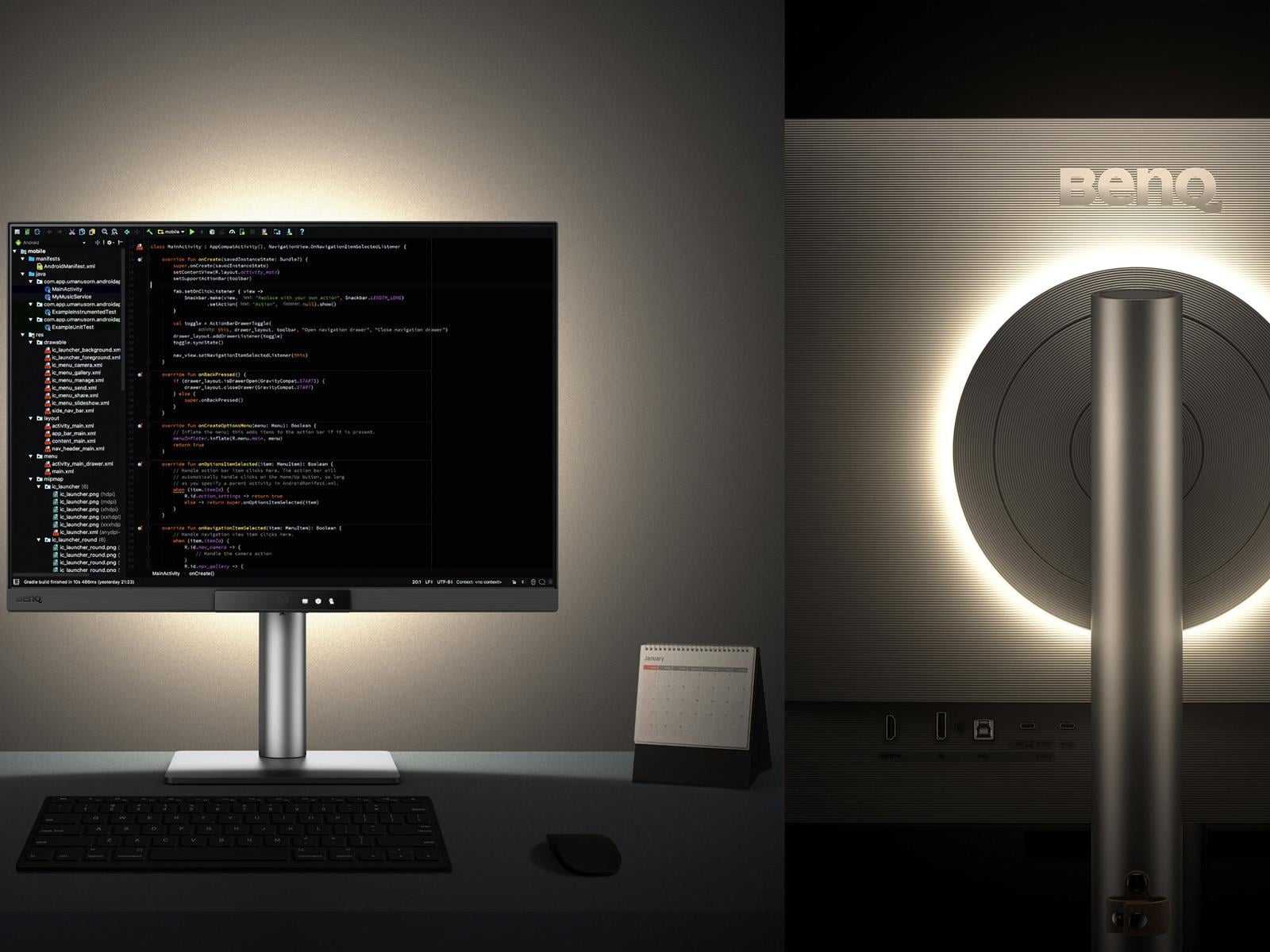

Stay productive on the go without breaking the bank.
The post Amazon Restocks Its 15.6″ Portable Gaming Monitor at an All-Time Low and Already Close to Selling Out Again appeared first on Kotaku.
Companies are spending vast sums on AI expecting the technology to boost efficiency, but a new survey from AI consulting firm Section found that two-thirds of non-management workers among 5,000 white-collar respondents say they save less than two hours a week or no time at all, while more than 40% of executives report the technology saves them upward of eight hours weekly.
Workers were far more likely to describe themselves as anxious or overwhelmed about AI than excited — the opposite of C-suite respondents — and 40% of all surveyed said they would be fine never using AI again. A separate Workday report of roughly 1,600 employees found that though 85% reported time savings of one to seven hours weekly, much of it was offset by correcting errors and reworking AI-generated content — what the company called an “AI tax” on productivity.
At the World Economic Forum in Davos this week, a PricewaterhouseCoopers survey of nearly 4,500 CEOs found more than half have seen no significant financial benefit from AI so far, and only 12% said the technology has delivered both cost and revenue gains.
Read more of this story at Slashdot.
After a launch on December 4, Thief VR: Legacy of Shadow’s developers continue updating with changes to the shadowy adventure.
Out now on all major platforms available, Patch 3.0 in Thief VR: Legacy of Shadow addresses issues raised by the community while improving other aspects of the experience. Developer Maze Theory and publisher Vertigo Games note that the latest changes are built on the foundations of the first patch, released just a week after the game’s release. Graphical improvements aim to balance lighting in the dark environment alongside reduced crashes and bugs.
In Patch 3.0 the game also adds formal support for HTC Vive and Valve Index headsets on the SteamVR version. One of the more immersive mechanics within Thief VR: Legacy of Shadow was the choice to have players’ microphones pick up their sounds, making for unique interactions when luring NPCs from the shadows to their demise. Now players can set the specific mic input source from the options menu.
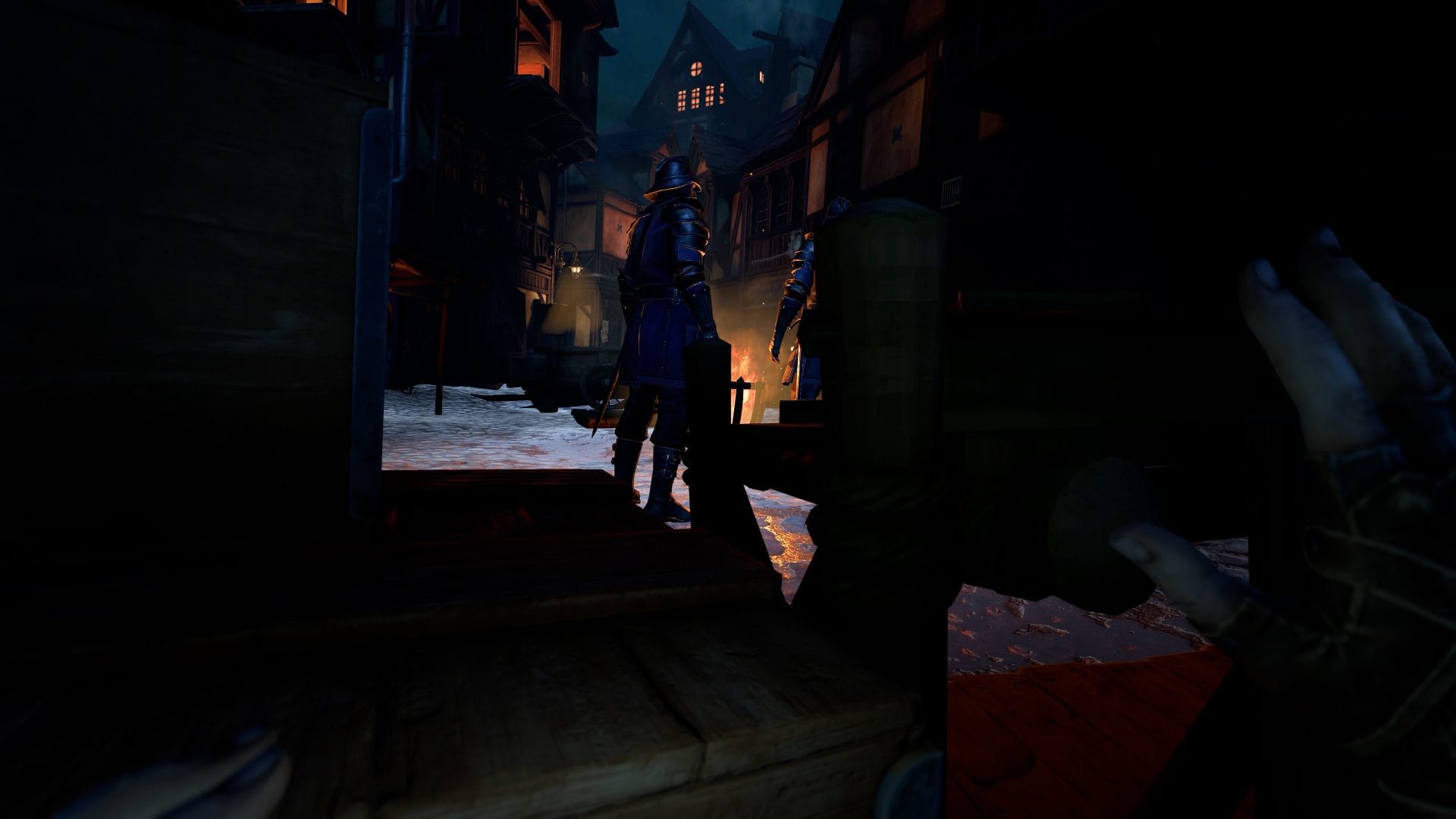
Our review mentioned “Thief VR: Legacy of Shadow may be a bit modest and rough around the edges, but it’s also impressive in the right ways,” and we gave it 4 out of 5 stars. Please share in the comments if you’ve given the new updates a try.
Thief VR: Legacy of Shadow is out now for PlayStation VR 2, Quest, and Steam.
We may earn a commission from links on this page. Deal pricing and availability subject to change after time of publication.
Mobile gaming stopped being a casual distraction a while ago. Big-budget titles, console-quality ports, and cloud streaming have turned phones into credible gaming machines. The problem is still input. Touch controls work until they don’t, especially once games demand precise movement, aiming, or long sessions. The Razer Kishi Ultra is built to fix that gap. And it’s currently $79.99 on Amazon, which online price trackers confirm is its lowest price to date. It fits most phones, even with cases, and can expand wide enough to hold an iPad mini, which gives it more range than controllers built only for phones.
In use, the Kishi Ultra feels closer to a traditional console controller than a typical snap-on accessory. It’s large and deliberately so, with thick grips that distribute the weight of your phone instead of cramping your hands. The triggers use Hall Effect sensors, which provide smoother movement and more consistent input than standard triggers, especially noticeable in racing games and shooters where partial pulls matter. The face buttons are mechanical and clicky, and the eight-way D-pad handles precise inputs well for fighting games and older titles. Razer also includes two extra programmable bumpers that can be mapped through its app, which helps in games that benefit from quick-access controls.
That said, there are some trade-offs worth noting. The controller connects over USB-C, so it won’t work with older iPhones that still rely on Lightning. The wired connection does bring one upside: You can plug it into a PC and use it like a standard controller, which adds value if you move between platforms. On iOS, cloud gaming support can feel inconsistent with services like Xbox Game Pass, while Android tends to be smoother overall, notes this PCMag review. Still, if you want mobile gaming to feel closer to a console session, the Kishi Ultra makes a convincing case at this price.
The Razer Kishi Ultra is a full-size mobile gaming controller that brings console-style controls to phones and tablets. It’s now $79.99 on Amazon, the lowest price it has hit so far, making it easier to justify if you want more precise controls for mobile or cloud gaming.
Back in August, Adobe debuted Acrobat Studio. The new service saw Adobe bring the humble PDF into the 21st century with support for a handful of new genAI features, including PDF Spaces, a hub where you can upload up to 100 documents and have AI summarize them. Now the company is enhancing the capabilities of those hubs with the introduction of four new genAI features inside of Adobe Acrobat, Acrobat Studio and Adobe Express.
The next time you add documents and files to a PDF Space, you can prompt Adobe’s built-in AI assistant to generate a presentation from those materials. The software will first create an outline. From there, you can select from a handful of “professional” designs to build the presentation around, and then make tweaks. Adobe says the majority of changes, including copy edits and image swaps, can be made without the need to generate entirely new slides. Once you’re happy with the results, you can share the presentation with your co-workers for further editing. Adobe has also made it easier to collaborate inside of PDF Spaces. With this latest update, you can invite others to add files and leave notes.
On the subject of editing, you can now carry out a dozen different tweaks using natural-language prompts. That includes adding text, comments, images and e-signatures. If you’re old-fashioned like me, Adobe has also reworked the Help section to offer step-by-step instructions on how to complete most tasks.
Last but not least, Adobe is borrowing a page from NotebookLM by adding a feature that allows users to generate podcasts from a PDF Space. This works much like it does in Google’s app. Acrobat will default to centering the generated podcast around two hosts having a conversation about the material you want summarized.
Adobe says Acrobat’s AI features have been highly popular, in part because users are finding those tools are saving them time. As you might expect, the company reports students have had a particularly strong response to its efforts to add AI inside of Acrobat, seeing as the app can generate summaries of course material while providing citations for fact checking.
This article originally appeared on Engadget at https://www.engadget.com/ai/adobe-acrobat-can-now-generate-presentations-and-audio-podcasts-from-your-documents-140000146.html?src=rss

The 15-year-old game finally adds Dixie Kong
The post Nintendo Is All Over The Place With Free <i>Donkey Kong Country Returns</i> Update appeared first on Kotaku.
Microsoft has announced some solid additions to Game Pass this month, ranging from AAA titles to indies, including some of our favorites from 2024 and 2025. Topping the list is Death Stranding Director’s Cut, an extended version of Hideo Kojima’s 2019 sci-fi action game (now available). Other key inclusions are Warhammer 40,000: Space Marine 2 (January 29) and puzzle game The Talos Principle 2 (January 27).
We’re also seeing some award winners including Indika (February 2), a surreal tale about the devil living inside a nun’s head, one of Engadget’s 2024 games of the year. Last year’s Ninja Gaiden Ragebound (available today), a hack-and-slash platformer with top-notch pixel, was on our list for one of 2025’s best games. Finally, Roadcraft allows you to operate a fleet of 40 authentic construction vehicles to clear debris, repair bridges and restore infrastructure.

Along with the games, there are a few DLC releases arriving soon as well. The Sims 4 players (Ultimate, Premium, or PC tiers) will gain The Sims 25th Birthday Bundle on Jan. 22. You also get Grounded 2, Dead by Daylight (extra Stranger Things content coming January 27) and and Sea of Thieves, with season 18 act 2 coming on January 22.
Here’s a list of key games and tiers arriving on Game Pass over the next month:
Death Stranding Director’s Cut (Ultimate, Premium, PC ) on January 21
RoadCraft (Ultimate, Premium, PC) on January 21
Ninja Gaiden Ragebound (Ultimate, Premium, PC) on January 21
The Talos Principle 2 (Ultimate, Premium, PC) on January 27
Anno: Mutationem (Ultimate, Premium, PC) on January 28
Drop Duchy (Ultimate, Premium, PC) on January 28
MySims: Cozy Bundle (Ultimate, Premium, PC) on January 29
Warhammer 40,000: Space Marine 2 (Ultimate, Premium, PC ) on January 29
Indika (Ultimate, Premium, PC) on February 2
Final Fantasy 2 (Ultimate, Premium, PC) on February 3
At the same time, here are the titles leaving January 31:
Shady Part of Me (Cloud, PC, and Console)Cataclismo (PC)
Starbound (Cloud, PC, and Console)
Lonely Mountains Snow Riders (Cloud, PC, and Console)
Paw Patrol World (Cloud, PC, and Console)
Citizen Sleeper 2 Starward Vector (Cloud, PC, and Console)
Orcs Must Die! Deathtrap (Cloud, PC, and Console)
This article originally appeared on Engadget at https://www.engadget.com/gaming/xbox-game-pass-adds-death-stranding-dc-ninja-gaiden-talos-principle-2-and-more-134126315.html?src=rss

If regular fans aren’t doing the job, it might be time to switch to liquid cooling.
The post ASUS Crashes Its CPU Liquid Cooler to Its Lowest Price Yet, Matching Black Friday Pricing appeared first on Kotaku.
Back before Reddit became the unofficial “front page of the internet,” you would dig up your next long read or binge watch on Digg. Starting in 2004, the original version of the site worked much like Reddit does today, with community members submitting content they found interesting to premade category pages and others voting on it until an algorithm eventually decided what should make its way to the front page. Aside from the lack of user-made pages like subreddits, it was generally pretty familiar to what modern users might expect—and, speaking from experience, it was a big deal to be featured on Digg.
Unfortunately, starting in 2010, the site went through a few drastic redesigns that added controversial features like the DiggBar (a clunky toolbar that would display over content) and got rid of features like burying (the equivalent of modern downvoting). It bounced from owner to owner and experimented with new formats like a manually curated front page, but by that point, Reddit had become the behemoth it’s known as today. It was hard for Digg to keep up.
Now, after Reddit has spent years saddled with its own controversies, Digg is back with yet another relaunch, with a new beta from original founder Kevin Rose and Reddit co-founder Alexis Ohanian that aim to combine the best of both site’s legacies.
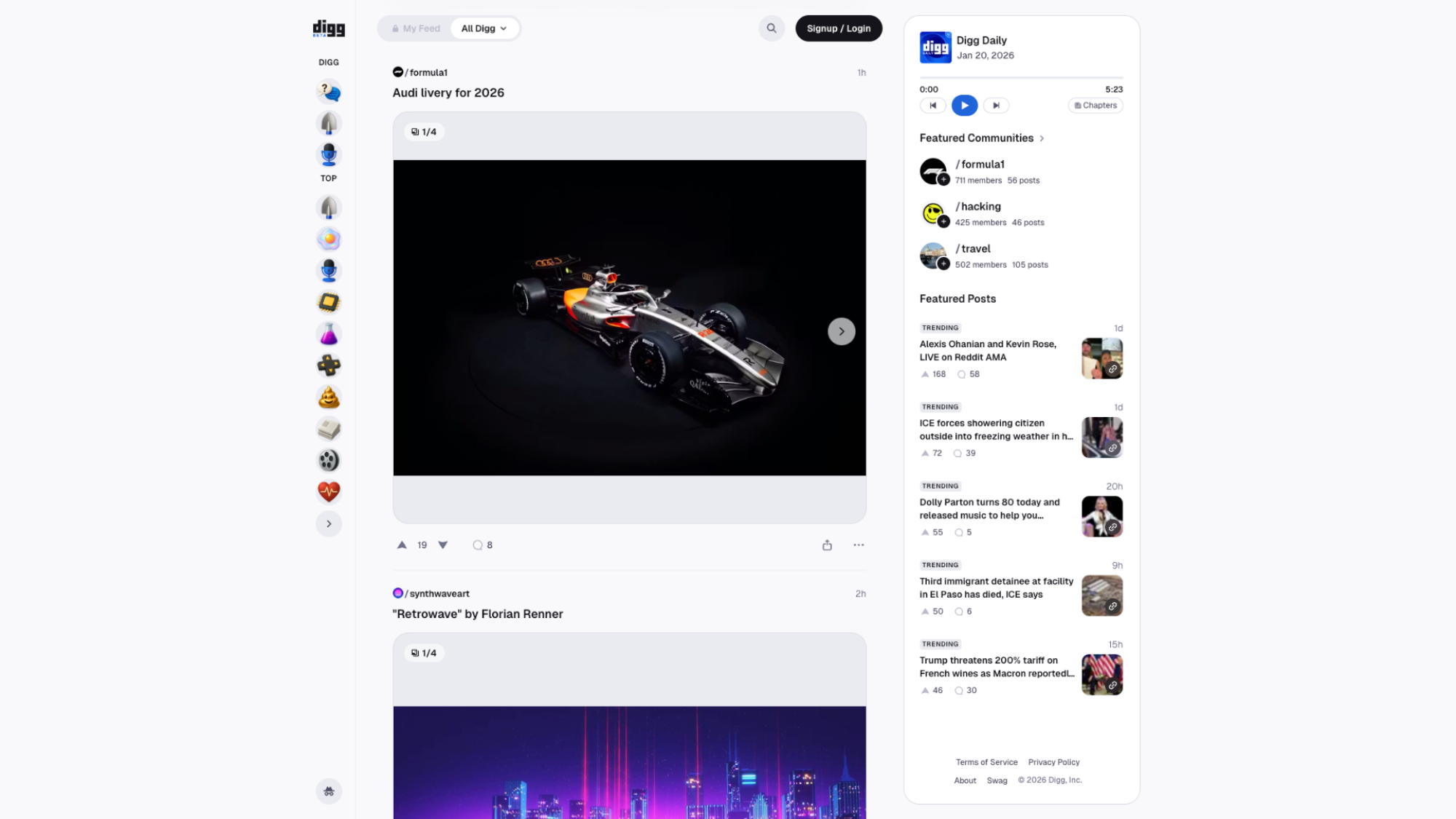
Last week, Rose and Ohanian opened their new Digg to the public, debuting a new design that looks a lot like Reddit, but cleaner. On desktop, the sidebar on the left uses icons rather than labels, and generally has fewer complications, so no distracting “games on Reddit” tab. To the right of that, you get your main, infinite scrolling feed, and I’ll admit, I like the classic blue-on-white color scheme (although you can use dark mode if you like). Unlike the classic Digg, this feed will include user-made communities, which work like subreddits, so you can join and leave them at any time to curate what you see. And yes, the downvote is back, along with full commenting functionality. You can also swap over from a feed that only shows communities you’re subscribed to (My Feed) to one that collects the best posts across Digg (All Digg) with a button up top, which is one pretty significant difference—Reddit has the r/all subreddit, but it requires navigating away from your main feed and isn’t available in the app.
But the big difference maker is in the right sidebar, which shows recent posts on Reddit, but “Digg Daily” on Digg. This shows trending posts and featured communities at a glance, so you can get caught up with news without having to scroll the “All Digg” feed for too long, but curiously, it’s also got the “Digg Daily” podcast. This one addition is probably the most significant way the new Digg differs from Reddit, and also the most awkward.
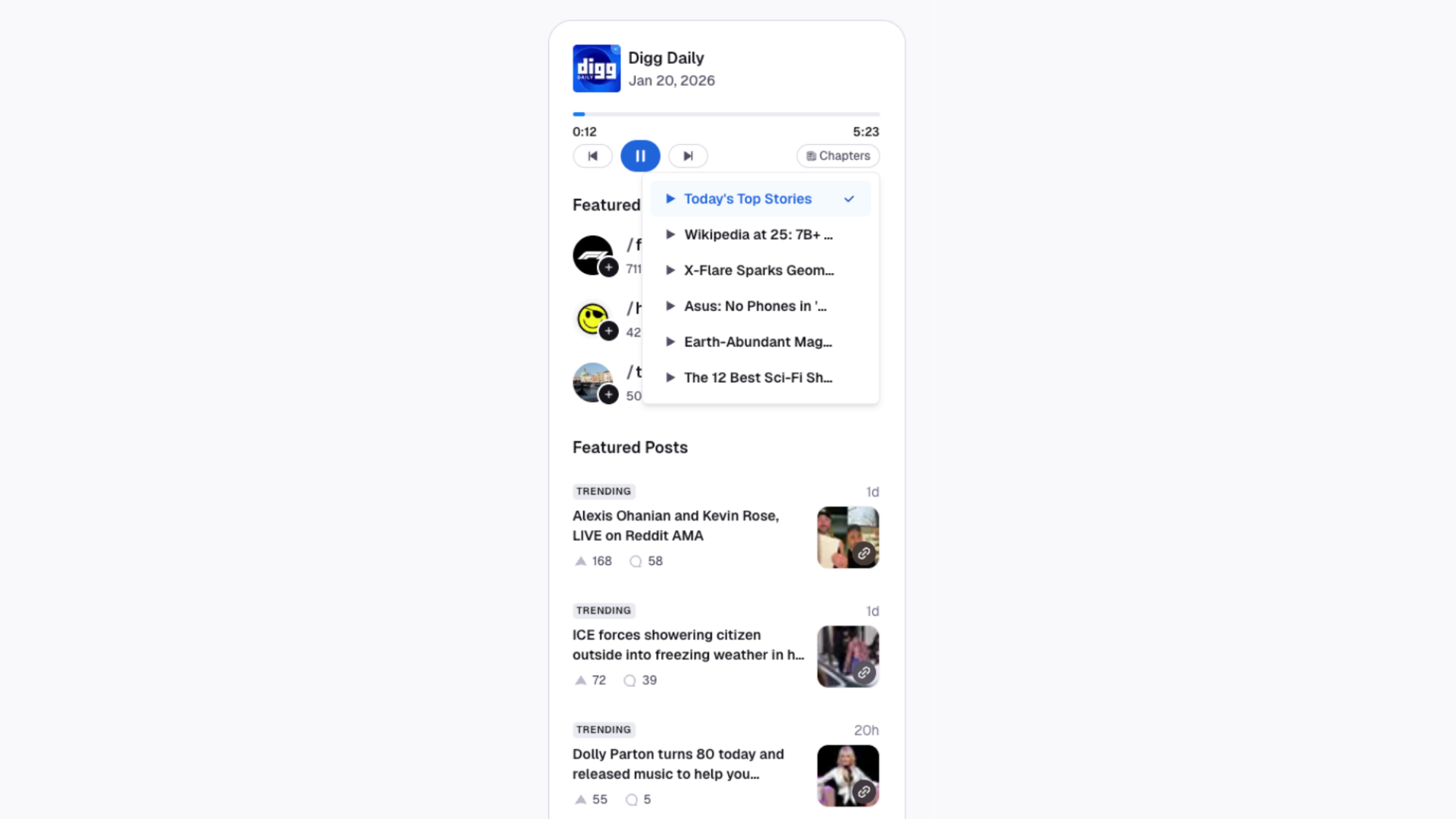
It had to be here somewhere—Digg Daily is the site’s implementation of AI. Updated once a day, this brief five-ish minute podcast recaps the biggest stories on the site that day, using AI hosts that sound like slightly more robotic versions of the ones you’ll get on Google’s NotebookLM. You’ll get a few sentences talking about the story’s original source (which, when I listened, did credit the author of the article being discussed), as well as a few quotes from readers. Unfortunately, while you can bring up chapters to jump ahead in Digg Daily and see a list of discussed topics, there aren’t any links to find either the sources or Digg posts being discussed, and the “Featured Posts” bar below Digg Daily doesn’t relate to what’s on the podcast at all.
It’s a nice idea, but aside from getting a high-level overview of what was popular on the site that day, I didn’t find it too useful. Summaries are extremely short, and comments are awkward to hear outside of their original context. It might be a good first step to know what to search the site for, but links would really help it out.
On the plus side, Digg Daily might not always be AI: The company said during an interview with TechCrunch that it might swap out the robotic hosts for human ones following user feedback. Human lead curation could help the recaps feel a bit more natural, and even bring back some elements from the eras of Digg where the front page was managed by a staff rather than an algorithm.
Aside from the different look and minor additions like Digg Daily, getting started on Digg should be pretty familiar for anyone who’s used Reddit. The mobile app also has full functionality, although sidebar features have been moved to buttons above and below the main feeds. But there are a few ways the platform is looking to grow.
The big one is probably communities, or Digg’s version of subreddits. The site launched with 21 default communities off the bat, but it’ll take a while for user-made communities to pop up for more obscure topics. For instance, I’ve been replaying the Mega Man: Battle Network games from my youth a lot lately, and while there are multiple regularly updated subreddits for that series with thousands of members each, there’s not a Digg community for them yet. It sounds like a small complaint, but one of Reddit’s big strengths is that you can just Google “[topic] + reddit” and probably find an answer to whatever question you might have, no matter how small. Without years of posts on topics both big and small to lean on, it’ll take Digg some time to catch up.
You can help with that by starting a community, but weirdly, communities right now can only have a single moderator, so be prepared to do a lot of heavy lifting.
However, the growing pains aren’t all bad. Personally, I can’t stand that modern Reddit pushes users to theme their avatars around its mascot, and buries the button to just upload their own images deep in the Settings page. Especially because the best options for dressing up your avatar are paywalled. Digg doesn’t have any paywall or mascot dress-up feature, so uploading your own photo to be your Digg avatar is the only way to go. Overall, it’s a less bloated experience.
While Digg might be light on features now, it does have the basics down, and that TechCrunch interview pointed to more possibilities coming down the line. For instance, the owners might be using AI in some ways, but they’re also big on fighting AI spam. They said they’re not opting for one universal solution, but are looking at options on a case-by-case basis.
In the interview, they discussed possibly forcing users of a community based around a product to prove they own that product before they can post. Similar suggested solutions were using location data to see if community members had attended in-person meetups, although that raises privacy concerns.
“I don’t think there’s going to be any one silver bullet here,” Rose told TechCrunch, but the general idea is to build trust and ensure users are authentic while remaining non-intrusive. This would help keep suspicious writing that sounds like ad copy or political brigading off the site, but would also keep users from having to upload personal data or pay for a one-time verification badge. Given that thousands of subreddits famously went dark in 2023 over a lack of trust between moderators and the site’s owners, it’s a noble goal, at least. It also tracks with Digg’s promises of more public moderation and relaxed ownership of user-generated material, although I’ll leave legal experts to comment on those in detail.
Overall, it’s encouraging that most of the features being discussed here are about core posting usability, although there are a few fun ideas sprinkled in, too, including plans to allow users to customize the look and feel of their communities, as well as add integrations with other sites—for instance, allowing Letterboxd scores to natively show up on a movies community.

If this all sounds interesting to you, you can try the Digg beta right now, and despite that “beta” name, it’s not too different from signing up for any other site. Just navigate to Digg.com or download the Digg app, click the “Signup/Login” button at the top of the feed, enter an email, and claim a username. After you authenticate using a code sent to your email, you should be all set to start scrolling and subscribing to communities.
Or, you can scroll without being signed in, if you’re OK with using the default feed. You can also still visit individual communities, by searching for them in the site’s search bar.
A new Snap Store scam campaign abuses expired publisher domains to bypass trust signals and deliver malicious app updates.

You won’t want to miss out on these headphones if you want to focus on the music you love.
The post JBL Clears Out Tune 770NC Headphones at Nearly 50% Off, Now Almost 7× Cheaper Than AirPods Max appeared first on Kotaku.
This week’s out-of-touch guide is a mélange of internet nonsense that reflect real world anxieties. A gritty part of London is going viral for a taxpayer-funded water park that only exists thanks to AI videos made to enrage racists. Inside the kid-centric videogame Roblox, users are protesting both ICE and age verification without ever leaving their avatars. And in the darker corners of the online world, looksmaxxers are determining who is a HTN, while everyone on TikTok is saying, “Screw it. We’re going to pretend to be birds.”
It might sound like the name of an outré sex act or a cocktail from the 1980s, but a Croydon Water Park is something else entirely, and it’s going to take some exsplaining. Croydon is a large town in South London with a reputation as a rough, gritty place, known (fairly or unfairly) for its concrete and crime. It’s also diverse—51% of its population identifies as Black, Asian, or from a minority ethnic background—so U.K. racists generally don’t like Croydon. The “water park” bit comes from people posting AI-generated videos of face-masked men (“roadmen,” in slang) enjoying Croydon’s waterpark, which doesn’t exist, often with “reminders” that it’s “taxpayer funded.” This is rage bait for old, racist Brits. Here’s a representative sampling:
Other AI created locations in Croydon include this tax-payer funded buffet:
And the Croydon Aquarium:
In the online hall of mirrors, it’s impossible to tell how many of the angry wankers in the comment section are legit, and how many are kids cosplaying as angry wankers. Judge for yourself on the #Croydon tag.
Digital activism can be messy. Recently, in response to ICE protests in Minnesota, Roblox users have been staging their own demonstrations within the game. Led by @clipsforcloset, users are reenacting ICE raids, holding up signs, and otherwise expressing their deep feelings about current events. It looks like this:
Here’s a demonstration featuring ICE vans rolling up to a pre-school:
Protesting in a game isn’t likely to have an immediate effect on the real world, but in terms of educating an extremely hard-to-reach population about what happening outside their computers, it could be effective. But it seems that the issue that’s most important to many Roblox users isn’t ICE, but the platform’s age verification requirements.
Roblox’s newly rolled out restrictions on chat require users to either provide an ID or pose for a series of photos so their age can be determined—otherwise, they can’t chat. From the guess-the-age bot getting it totally wrong, to privacy questions, to people selling age-verified accounts online, there is a lot wrong with Roblox new policy, so some Roblox users are organizing “marches” on the virtual headquarters of Roblox that seem to be against both ICE and the chat restrictions.
Some have pointed out that marching in a game means you’re adding to the player count, so it might not be the most effective means of protest, but it’s interesting that the same kind of “What’s the point?” arguments and inability to keep protestors “on message” are known issues in real-life activism. Speaking of real life, so far, it doesn’t look like Roblox age verification is affecting its parent company’s stock price.
The acronym “HTN” stands for “high-tier normie.” In normal language, you might call a HTN a “good looking guy,” but not like male-model good-looking. It comes from the online community of “looksmaxxers,” people focused on maximizing physical attractiveness. Looksmaxxers use what they consider an objective gauge of human facial attractiveness called the PSL scale, and a HTN has a 4.5 to 5.5 out of 8 on the PSL scale. All of this is totally nutso of course, but a lot of younger men think it’s truth. If you know any younger men like that, explain to them that scoring high on the “being a semi-decent person” scale beats any number on the PSL scale.
This week, TikTok is being overtaken by people doing impressions of owls. The meme works like this: You say, “This is my impression of an owl if it was X” and act it out. The X can be anything. Celebrity owls are popular, like this impression of an owl if it was Michael Jackson:
There are lots of owl impressions of groups, like this owl that is an “Italian American, but also from New York.”
If you dig a little deeper, you get into more conceptual owls, like an owl that is “an overstimulated millennial mom who is teaching herself to self-regulate while teaching their child to self-regulate,”
or an owl “that is ChatGPT.”
For thousands of videos featuring countless kinds of owls, check out TikTok’s owl impersonators.
Samsung’s 2025 was filled with new foldables, an ultra-thin new form factor and the launch of Google’s XR platform. After making some announcements at CES 2026, the company is expected to host its first Galaxy Unpacked of the year in February to introduce the Galaxy S26 lineup.
Engadget will be covering Galaxy Unpacked live, and we’ll most likely have hands-on coverage of Samsung’s new smartphones soon after they’re announced. While we wait for an official invite, here’s everything we expect Samsung will introduce at the first Galaxy Unpacked event of 2026.
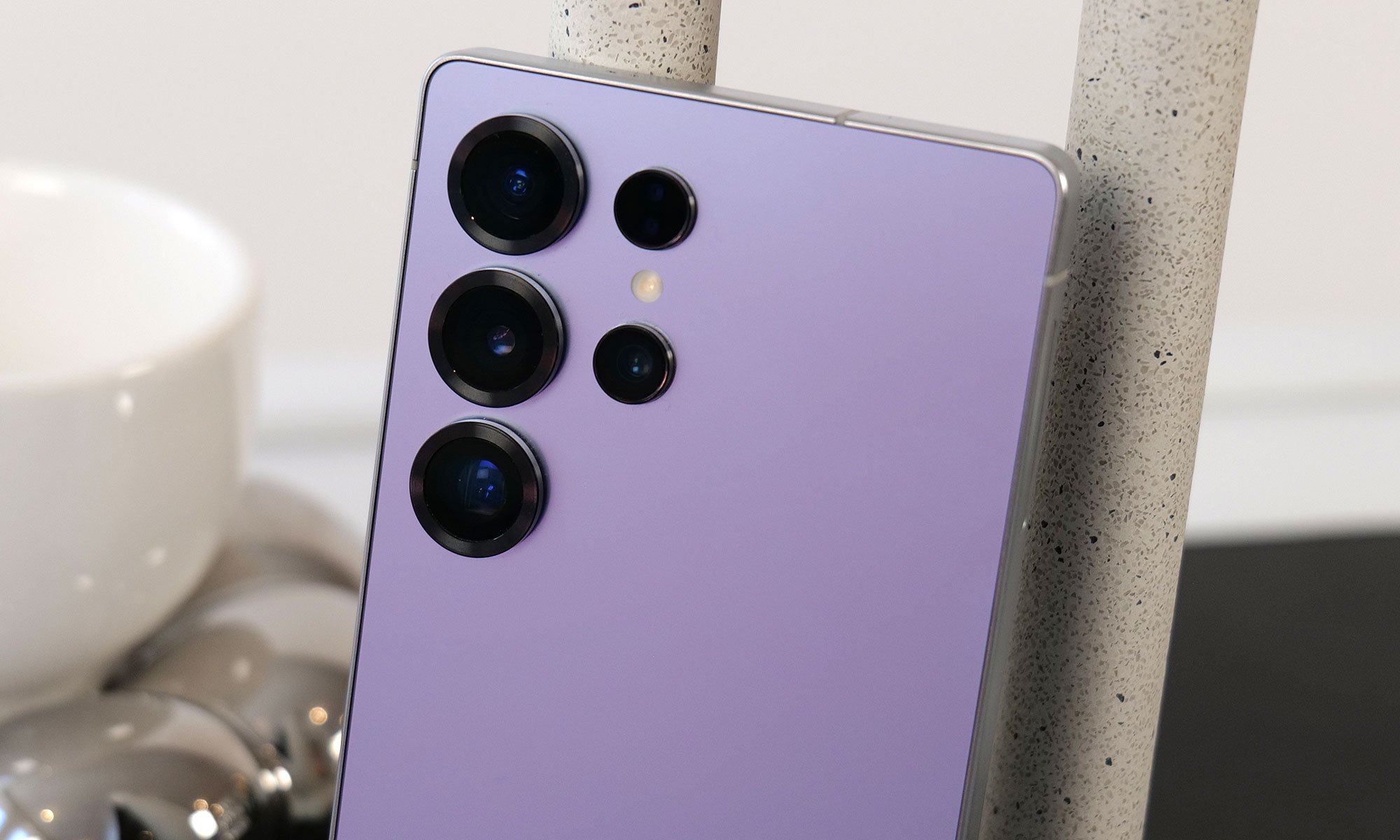
Samsung’s restrained approach to updating its phones will likely continue with the Galaxy S26. Based on leaked images of the new lineup, the company is not expected to radically reinvent the look of the Galaxy S26, Galaxy S26+ or Galaxy S26 Ultra, and instead will stick with a similar design to what it used on the Galaxy S25. The phones will have a flat front screen and frame, with rounded corners and cameras housed in a vertical pill-shaped plateau on the back. Unlike Apple’s move from the iPhone 16 Pro to the iPhone 17 Pro, the biggest difference here will likely be internal components like the screens, chips and camera sensors Samsung uses.
Qualcomm’s new Snapdragon 8 Elite Gen 5 chip is expected to be in all Samsung Galaxy S26 phones, though Korean news site Yonhap News reports Samsung’s relatively new Exynos 2600 chip could be used in some phones in the lineup depending on the region, a strategy Samsung has deployed in the past. Either way the new phones should be more performant than the previous generation, and in the case of the models with the Snapdragon 8 Elite Gen 5, particularly good at on-device AI processing.
I have compiled the most accurate comprehensive parameter comparison of Galaxy S25, S25+ and Galaxy S26、 S26+. Which one do you want to buy? pic.twitter.com/aQpoSvYjOz
— Ice Universe (@UniverseIce) November 29, 2025
One notable difference between the Galaxy S26 and the Galaxy S25 could be the phone’s screen. The new phone will reportedly feature a 6.3-inch FHD+ display according to specs shared by leaker Ice Universe, which makes it ever so slightly larger than the 6.2-inch display used on the Galaxy S25. The S26 will also allegedly come with 12GB of RAM, either 256GB or 512GB of storage and a slightly larger 4,300mAh battery. Samsung isn’t changing the cameras on the entry-level phone, though: leaks suggest it’ll feature the same 50-megapixel main camera, 12-megapixel ultrawide, 10-megapixel 3x telephoto and 12-megapixel selfie camera as the previous generation. Changes appear to be even more minor on the Galaxy S26+. Other than the new Snapdragon chip, the phone will reportedly feature the same 6.7-inch FHD+ screen, 4,900mAh battery, 12GB of RAM and the same camera array used on the base Galaxy S26.
The difference between the Galaxy S26 Ultra and Galaxy S25 Ultra is reportedly a bit clearer. According to Android Headlines, the new phone’s cameras will be slightly more raised, and stand out thanks to a new metallic finish. Samsung may also switch back to using an aluminum frame on the Galaxy S26 Ultra, after using titanium frames on both the Galaxy S24 and S25 Ultras. Most importantly, to make the phone actually support Qi2 rather than only technically work with the standard when a case is attached, rumors suggest Samsung will remove the S Pen digitizer layer in the phone and adopt a new method for accepting stylus input. It’s not clear what that new method will actually be, but it could let the Galaxy S26 Ultra more easily work with Qi2 accessories without losing its stylus.

Samsung released the Galaxy Buds 3 and 3 Pro in 2024, with a major redesign that brought them much more in line with Apple’s AirPods. The Galaxy Buds 4 and Buds 4 Pro Samsung is rumored to be announcing soon won’t necessarily change that, though they will feature a more compact case and less angular stems, according to leaked images from the Samsung Tips app.
Support for head gestures to accept and decline calls, a feature Apple includes on the AirPods Pro 3 and AirPods 4, is also rumored to work on both versions of the new Galaxy Buds. SamMobile reports the Galaxy Buds 4 and 4 Pro may also ship with a new Ultra Wideband chip that will make them easier to find with Google’s Find Hub network.
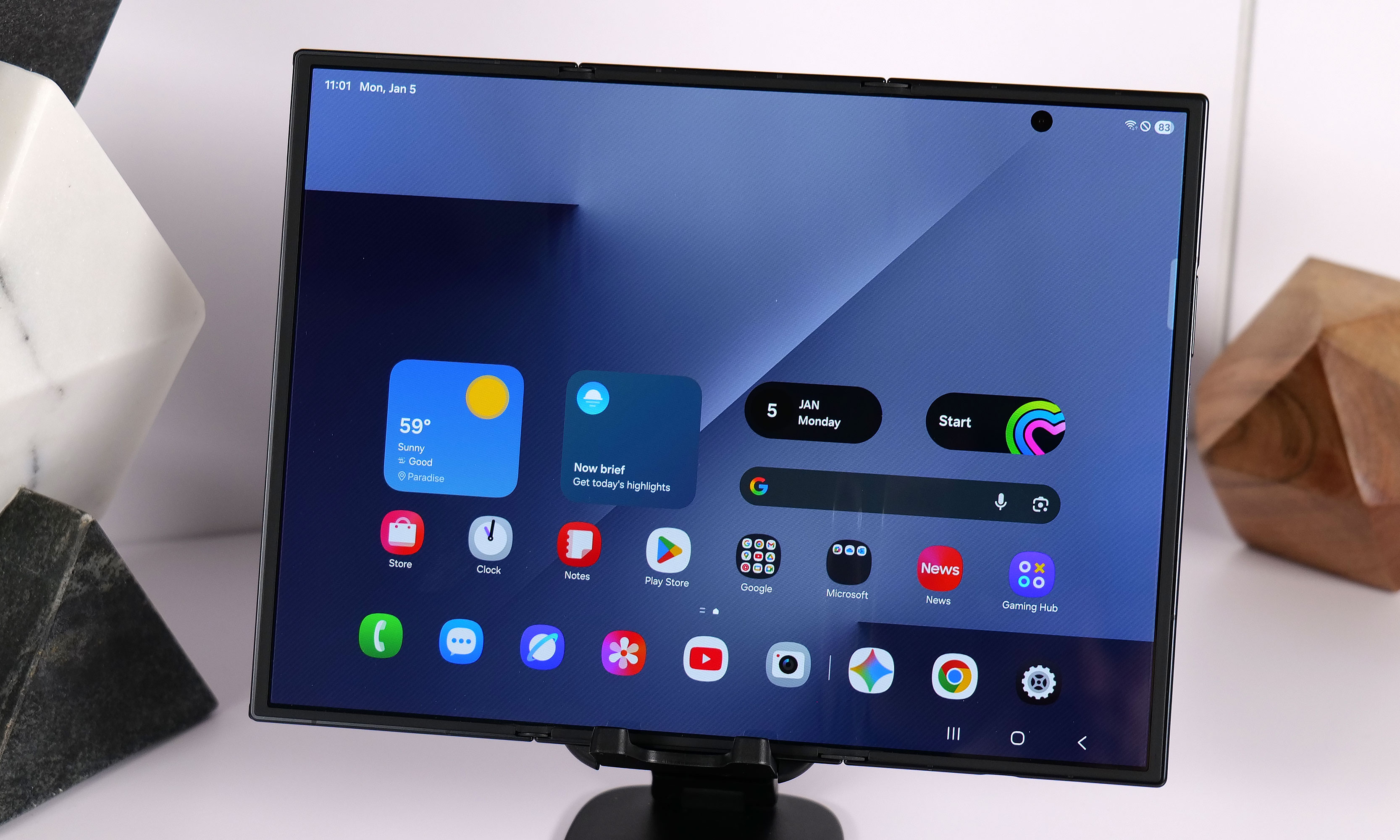
Samsung announced the Galaxy Z TriFold in late 2025 without firm details of when the new smartphone-that-folds-into-a-tablet would be available in North America. Considering the company had the new device available for hands-on demos at CES 2026, it seems possible it could share more information about when the Galaxy Z TriFold will be widely available at Galaxy Unpacked.

When the Galaxy S25 Edge was announced in 2025, it seemed possible that Samsung could replace its “Plus” smartphone with a unique form factor, just like Apple has opted to do with the iPhone Air. There have been conflicting reports on the matter, but it seems like Samsung will not be doing that with the Galaxy S26 Edge.
Instead, the smartphone will reportedly remain another option, much like foldables are for customers not swayed by Samsung’s traditional smartphones. The Galaxy S26 Edge is rumored to feature a slightly different design than last year’s model, according to Android Headlines, with a large rectangular camera plateau that’s reminiscent of Google’s Pixel phones, and the raised oval Apple used on the iPhone Air. Beyond that, the phone is also expected to be ever so slightly thinner at 5.5mm than the 5.8mm Galaxy S25 Edge.
Samsung already acts as a first place Google can show off new AI features for Android, but the company is reportedly exploring other AI partnerships, too. In June 2025, Bloomberg reported that Samsung was nearing a deal with Perplexity to integrate its AI-powered search engine across OneUI and its homegrown mobile browser. Perplexity already has a deal with Motorola on its Razr phones, so the only thing that would make a deal with Samsung unusual is the close relationship the company already has with Google.
The company also accidentally announced a new version of its Bixby AI assistant, which will likely also be integrated with Perplexity and could serve as an alternative to Google Gemini. Both a new Bixby and a deeper integration with Perplexity seem like natural new software features to show off at Galaxy Unpacked.
This article originally appeared on Engadget at https://www.engadget.com/mobile/smartphones/what-to-expect-at-samsung-galaxy-unpacked-2026-130000003.html?src=rss
One of the disconcerting things about using a virtual private network (VPN) is that it can be hard to tell when it’s doing its job. The best VPNs all work in the background to keep your IP address hidden and your communications with their servers encrypted. The better the VPN, the less you notice it, which can make a top-performing VPN feel (uncomfortably) like one that isn’t working at all.
Luckily, you’ve got options for checking whether your VPN is working — other than just taking the app at its word. In this article, I’ll cover the basics, then go through five different tests you can run to make sure you’re actually using an encrypted VPN server. For each test, I’ll explain what kind of problem it’s looking for, how to run it and what to do in case it fails.
Before you do anything else, though, it’s not a bad idea to check your VPN app and make sure you remembered to connect. It’s all too easy to open up the client app, choose a server, tweak some preferences and feel like your work is done. On top of that, we don’t always remember to tell VPN beginners that simply opening the client isn’t enough.
To check that your VPN is turned on, open the app on your desktop or mobile home screen. Each VPN designs its apps differently, but common signs include the color green, the word Connected and information on what server location you’re connected to.

If you don’t see anything like that, click the On button, which should be on the first page that appears when you log into the app. Most VPNs also connect whenever you click the name of a server location.
For those of you on iPhone or iPad, I’ve just written an explainer on how to turn a VPN off and on. For all the tests I’ll discuss across the rest of this article, make sure you’re connected to a VPN server before you run them. Also, make sure your internet connection is active — a VPN can only work when there’s internet.
Each of these tests investigates a different reason your VPN might not be working. We’ll start by looking for connection problems that might not be obvious, check for DNS leaks, WebRTC leaks and IPv6 leaks, then finally make sure an apparently active VPN is managing to change your virtual location.
Websites and internet service providers (ISPs) use IP addresses to identify devices and their owners online. A VPN’s most important job is to change your IP address to one matching its own server, which disassociates your identity from your online activities. Not doing this indicates a failure on a fundamental level: either the VPN says it’s connected when it isn’t, or its technology is active but somehow not sending you through the proper encrypted tunnel.
To check whether your VPN has changed your IP address, start by going to an IP address checker like whatismyipaddress.com or ipleak.net. This will show you the public IP address that everyone sees when you get online without a VPN, including the ISP that holds it and the geographic location it’s associated with. Write that down or take a screenshot.

Next, connect to your VPN. Remember the location you connect to, and note down the new server IP address if the VPN tells you what it is. Go back to your IP tester tool and refresh the page. You should now see an IP address and location that match the one you connected to through the VPN, including a different ISP.
If your IP address is the same as before, your VPN isn’t working. To fix this, try disconnecting from the server, waiting about 10 seconds, then connecting to the same location and trying the test again. This will show you whether the problem was with one individual server or an entire location.
If the problem persists, try a different server location, then a different VPN protocol. If it’s still leaking, try restarting your VPN client, your device and your modem (in that order). This should fix the problem, but if it doesn’t, move on to the remaining tests or get in touch with the VPN’s tech support.
A domain name system (DNS) server is an important step in getting a website to appear on your browser. DNS holds the information that connects URLs to the IP addresses of destination servers. If a VPN client lets your device contact a DNS server owned by your internet service provider without routing it through an encrypted tunnel first, the DNS request might reveal your real IP address to the ISP.
You can check for DNS leaks by connecting to your VPN, then going to dnsleaktest.com or another tool of your choice. The tester sends several innocuous DNS requests, then scans to see which servers resolve them. If you see your real ISP at all, you’ve got DNS leaks.
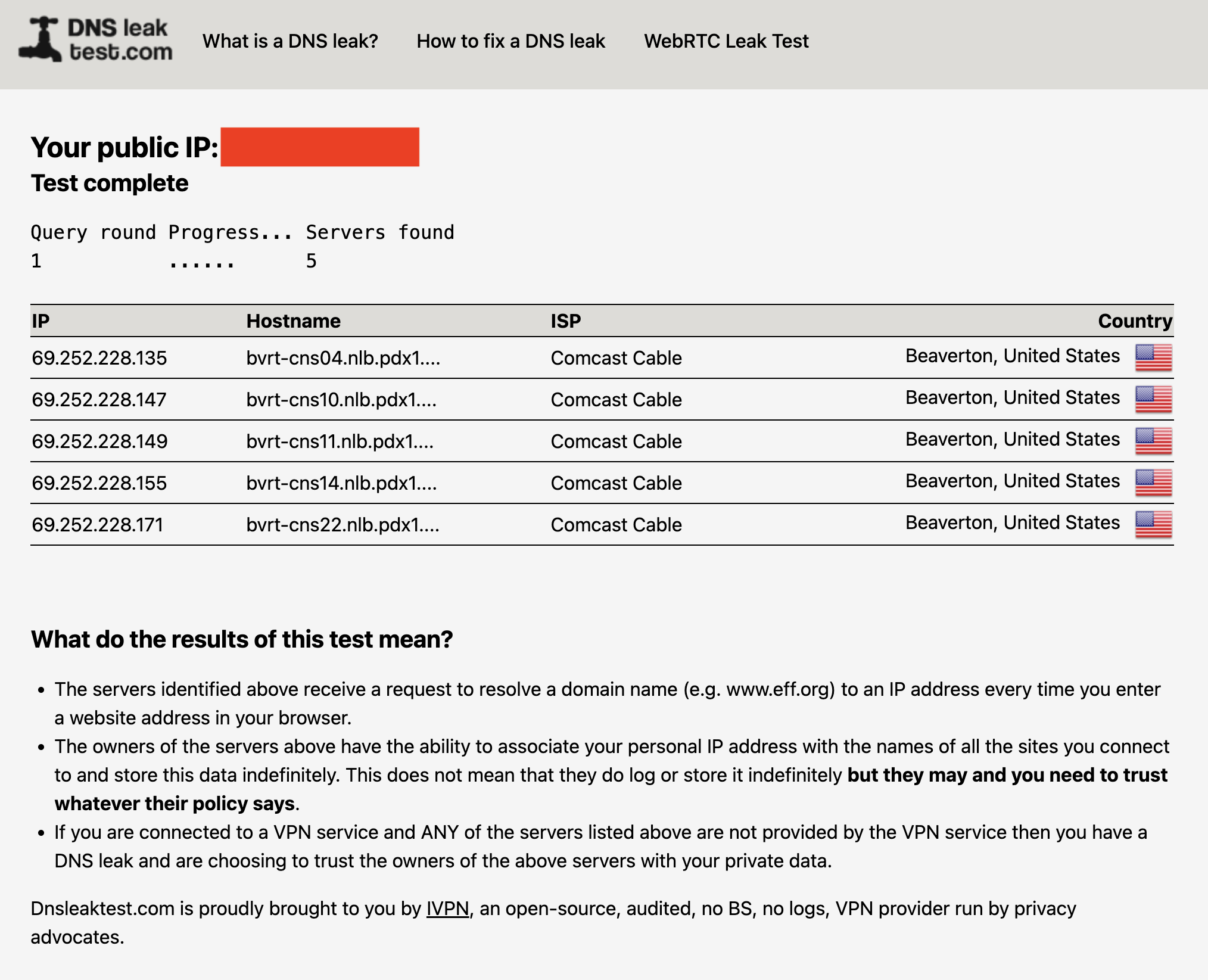
The fix for DNS leaks is more intensive than the fixes in step #1. Check your VPN’s control panel to activate any DNS leak protections and try again. IPv6 leaks can also appear as DNS leaks, so try disabling IPv6 in your browser (see #4 below for instructions). If you keep seeing leaks, you can also try clearing your computer’s DNS cache.
Here’s how to do that. On Windows, go to the Command Prompt (on Windows 10) or the Windows Terminal (on Windows 11). Enter the phrase ipconfig/flushdns. On Mac, open Terminal from the Utilities folder, then paste in the phrase sudo dscacheutil -flushcache; sudo killall -HUP mDNSResponder and hit Enter. Test the VPN once more to see if it’s still leaking.
WebRTC, which stands for Web Real-Time Communication, is a technology that lets browsers exchange information directly with each other. This is useful for text and video chats, streaming and more, but it’s also a potential security risk. WebRTC can serve as a backchannel that inadvertently sends your real IP address outside the VPN tunnel.
It’s pretty easy to test for WebRTC leaks. I recommend the tool ipleak.net, which checks for them as a matter of course. You can also use browserleaks.com/webrtc to run a test that’s particular to this kind of leak. These tools establish dummy connections through WebRTC, then test to see if the VPN still works when they’re active. As usual, if you see your real IP address, there’s a problem.
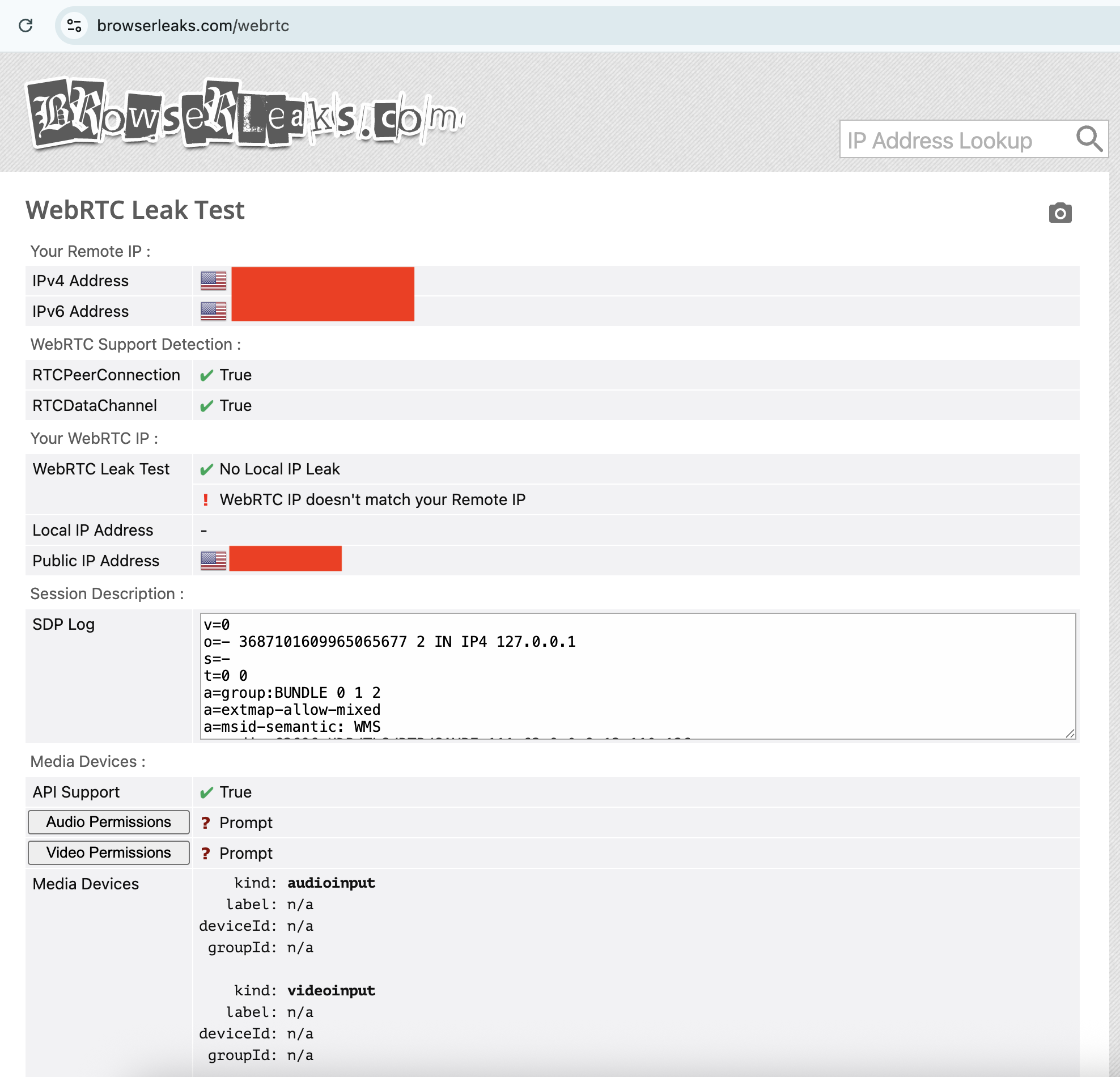
The fixes for a WebRTC leak are the usual ones: try different servers, locations and protocols, reset your VPN, device and modem, then try another VPN provider. However, if nothing is working, you can also disable WebRTC on your browser altogether. This means you won’t be able to do any real-time chatting (that’s Zoom, Google Meet, Teams and so on), so it’s a last-resort solution.
To disable WebRTC on Firefox, type about:config in the URL bar, click the message to accept the risk, type media.peerconnection.enabled in the search bar, then double-click the word True to change it to False. To turn WebRTC back on, just double-click False again.
On Edge, you can disable WebRTC by entering edge://flags in the URL bar, scrolling down to the option “Anonymize local IPs exposed by WebRTC” and making sure the dropdown next to it is set to Enable. There’s no built-in way to turn off WebRTC on Chrome, but you can install the WebRTC Control extension to switch it off and on yourself.
Next up, it’s possible that your real location is leaking through your IPv6 address, not IPv4. To make a long explanation short, IPv6 is a new way of formatting IP addresses that leaves more options available for the future. Since we haven’t yet hit the crisis point of IPv4 shortage, very few websites are restricted to IPv6 alone.
The problem is that most VPN apps were designed in the IPv4 era and aren’t built to protect IPv6 traffic. There are some exceptions, including NordVPN, but most VPNs block IPv6 traffic completely rather than retrofit themselves to work with it. However, if a VPN of that sort isn’t blocking IPv6 entirely, your IPv6 address and associated location can leak.
Any IP address checker can reveal an IPv6 leak, but you can find a specific test at test-ipv6.com. This site runs several exams that look for IPv6 readiness, but the most important line is the one that shows your current IPv6 address. This will probably say you don’t have one, since most ISPs don’t work through IPv6 yet — but if you do have one, it should match your active VPN’s location, not your real one.

Should it turn out that you’re leaking IPv6 requests, the easiest solution is to disable IPv6 on your computer. On Windows, you can do this through the network adapter options page of your control panel. Here’s how to get there:
Windows 10: Start -> Settings -> Network & internet -> Status -> Change -> Advanced network settings -> Change adapter options.
Windows 11: Settings app -> Network & internet -> Advanced network settings -> Related settings -> More network adapter options.
On both OSes, finish the job by right-clicking the name of your internet connection, selecting Properties from the dropdown and unchecking the box next to Internet Protocol Version 6. Of course, you can always switch to another VPN that blocks IPv6 altogether, but you might find that to be a bigger hassle.
If you’re on Mac, open System Settings, click the Network tab and then click the Details… button next to your network name. In the new window, click the TCP/IP tab on the left, find the entry labeled Configure IPv6 and set the dropdown to Link-Local Only.
A VPN can be working perfectly and still fail to unblock streaming sites. Netflix, HBO Max and the others block VPN traffic because VPNs can make them show material in regions where they don’t hold the copyright. To avoid legal trouble, they set up their firewalls to block IP addresses known to belong to VPN servers.
If your VPN can’t get into a streaming platform, it’ll usually be obvious; the site will either display a proxy error message or simply refuse to load. However, in rare cases, the streaming site will load fine but show you the same shows you normally see. This indicates that you might be dealing with a VPN leak.
If that happens, follow the usual steps. Disconnect and reconnect to the same location to get a different server, then try different server locations. It’s also possible that the streaming site is getting your real location from your browser cache, so if the problem persists, clear your cache and cookies and try again.
There’s one more important step to make sure your VPN is working: test the kill switch. This common feature cuts off your internet connection if you lose touch with your VPN server. With your kill switch active, you shouldn’t be at any risk of accidentally broadcasting your real IP address, location or online activity.
To test your kill switch, you’ll need to simulate an abrupt loss of VPN connectivity. Open your VPN, make sure the kill switch is turned on, then connect to a server. Next, quit the VPN app without disconnecting. At this point, the kill switch should make it impossible for you to get online — if you can still browse the internet as normal, the switch might be faulty.
This article originally appeared on Engadget at https://www.engadget.com/cybersecurity/vpn/how-to-check-if-your-vpn-is-working-130000817.html?src=rss
An anonymous reader quotes a report from DroidLife: When the FCC cleared Verizon of its 60-day device unlock policy a week ago, we talked about how the government agency, which is as anti-consumer as it has ever been at the moment, was giving Verizon the power to basically create whatever unlock policy it wanted. We also expected Verizon to make a change to its policies in a hurry and they did not disappoint. Again, the FCC provided them a waiver 7 days ago and they are already starting to update policies.
As of this morning, Verizon has implemented a new device unlock policy across its various prepaid brands and I’d imagine their postpaid policy change is right around the corner. Brands like Visible, Total Wireless, Tracfone, and StraightTalk, all have an updated device unlock policy today that extends to 365 days of paid and active service before they’ll free your phone from the Verizon network. Starting January 20, Verizon says that devices purchased from their prepaid brands will only be unlocked upon request after 365 days and if you meet several requirements […].
What exactly is changing here? Well, if you purchased a device from Verizon’s value brands previously, they would automatically unlock them after 60 days. Now, you have to wait 365 days, request the unlock because it doesn’t happen automatically, and also have active service. […] The FCC mentioned in their waiver that by allowing Verizon to create whatever unlock policy they wanted that this would “benefit consumers.” How does any of this benefit consumers?
Read more of this story at Slashdot.
The fourth race of Zwift Racing League 2025/26 Round 3 happens Tuesday, January 27, and it’s a TTT on France’s Roule Ma Poule route. With a sizeable climb bookending the race, this route presents particular pacing predicaments for team time trialists!
Let’s dig into crucial segments, bike choice tips, and more…
We last raced Roule Ma Poule as a ZRL TTT back in September of 2023, but even if you didn’t race it back then, these roads are probably familiar to you.
The route totals 26.1km including the lead-in, and all categories will race the same distance. It is largely flat, apart from the climb up the backside of the Petit KOM, which will be done twice (once on the lead-in and once at the end of the race).
Here’s the route profile of Roule Ma Poule:
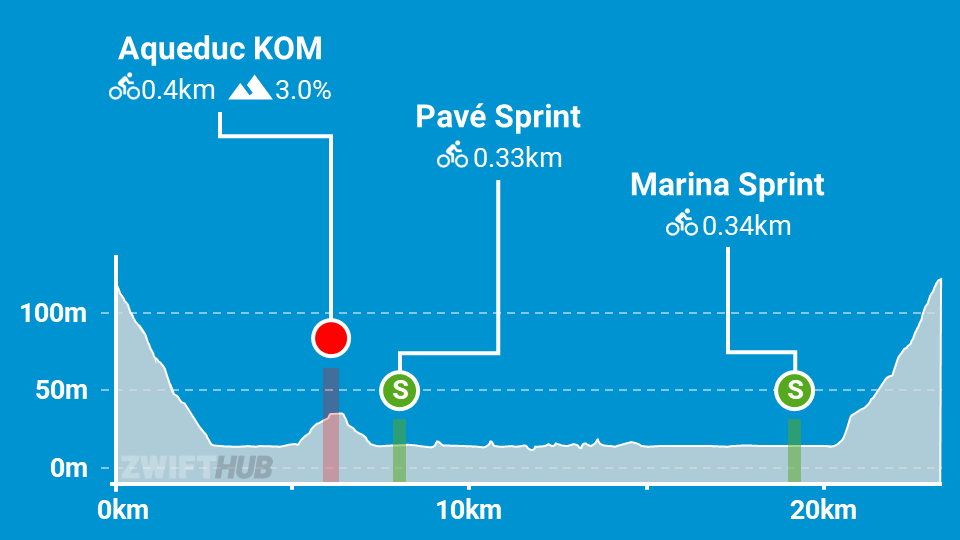
This profile doesn’t tell the whole story, though, because it doesn’t include the lead-in! The lead-in is almost entirely uphill, and in fact, we made a Strava segment for it:
The lead-in is 3.11km long, averaging 3.4%. It takes you from the start pens up the backside of the Petit KOM (or the foot of Ventoux, if you want to think of it that way) and dumps you off at the Petit KOM banner, which is the official start and finish line for Roule Ma Poule.
After finishing the climb for the first time, you get a bit of recovery on the Petit KOM descent before settling into your TTTrain for the flat portion of the event. Yes, you’ve got the Aqueduc KOM (0.42 km, 0.9%) to tackle, but it’s more of a sprint than a climb, with only a ~200-meter length of uphill road.
Following 17.4 flat kilometers, you will pass the start pens and arrive at the foot of the final climb. This is where teams may wisely choose to drop slower climbers as the four fastest go all-out for the line. But don’t drop your riders too soon – this is a very draftable climb, so it may make sense for them to do one last “suicide pull” before falling off.
Read more about the Roule Ma Poule route >
Bike choice here is simple: go aero. (Looking at our TT performance charts, a climbing frame like the Felt IA 2.0 will save you less than 1 second on the climb vs the top aero frames, while a more aero frame like the CADEX Tri will save you ~3 seconds on the flats of this race.)
The best setup by far is the CADEX Tri frame paired with the DT Swiss Disc wheels, but you’ll need to be at level 40+ to access this sweet rig:

If you don’t have access to this setup, check out “Fastest TT Bike Frames and Wheels at Each Zwift Level” and use the fastest TT frame and wheelset available at your level.
One more note on bike choice: upgrading your frame makes a big difference. A fully upgraded frame saves around 13 watts, or ~48 seconds per hour of riding. Read all about the performance improvements you receive from upgrades here.
Many recon rides are planned each week on the upcoming ZRL route. If you’re unfamiliar with this course, jump into an event and familiarize yourself with the route! Find a list of upcoming ZRL recon rides at zwift.com/events/tag/zrlrecon.
Additionally, riders in the Zwift community do a great job every week creating recon videos that preview the courses and offer tips to help you perform your best on the day. Here are the recons I’ve found (comment if you find another!):
Successful team time trialing on Zwift requires a challenging combination of physical fitness, proper pacing, and Zwift minutiae like picking a fast bike, understanding drafting in a TTT context, and getting your frame fully upgraded.
Most ZRL TTTs are on flatter routes than this week’s, allowing teams with big pure-power riders keep speeds high straight onto the podium. While it’s still vital to ride efficiently on all the fast flat roads in this race, properly pacing the climb, especially on the lead-in, is of utmost importance. You want to push as hard as you can while still retaining all of your team members over the top!
On a course like this week’s, consider having all team members set their Trainer Difficulty to the same value so you’re all feeling the gradient changes similarly. (When one rider has it set to 100% and another 25%, the first rider may ramp up power much more than the second when a climb hits, which can make a mess of your team formation.)
Your goal in a ZRL TTT is to get four riders across the line in the shortest time possible. That means every team’s pace plan will differ based on each rider’s abilities. I highly recommend having an experienced DS on Discord directing your team, especially if your team contains some inexperienced TTT riders.
Lastly, if you want to go further down the TTT rabbit hole and plan your race more precisely, check out Dave Edmond’s popular Zwift TTT Calculator tool.
Share below!